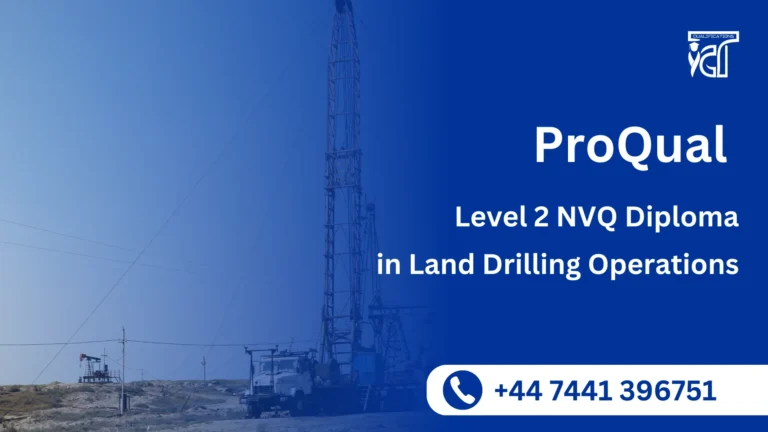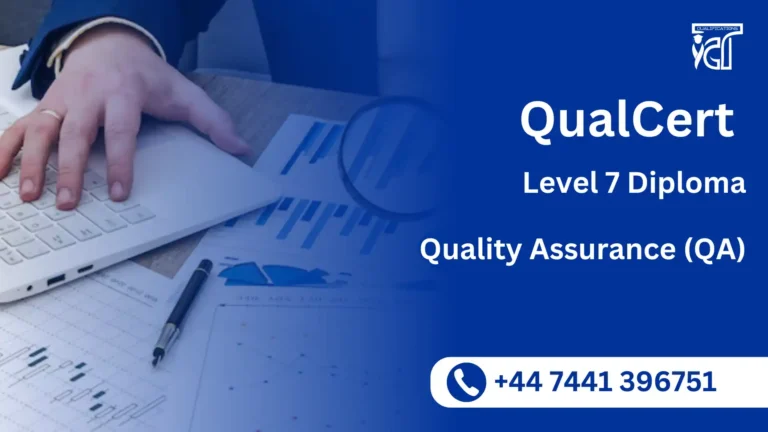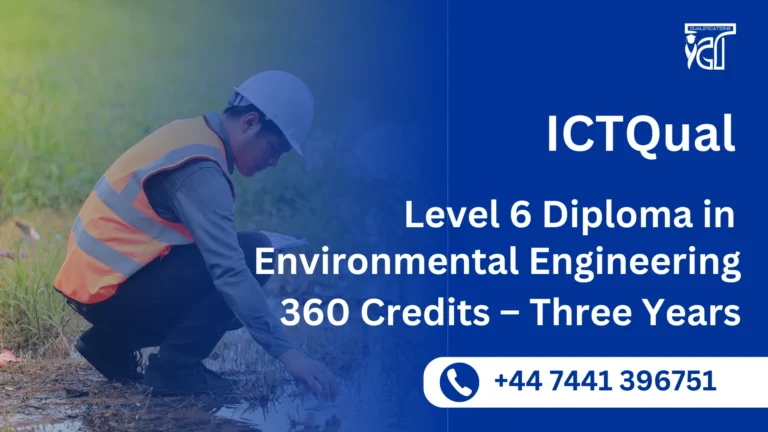The ProQual Level 7 Diploma in Environmental Management is a prestigious, Ofqual-regulated qualification that equips professionals with the highest level of strategic and practical knowledge in environmental leadership. Recognized as equivalent to a UK Master’s level qualification, it empowers graduates to lead sustainability initiatives, manage environmental risks, and develop governance policies that align with ISO 14001 standards.
Through a comprehensive curriculum spanning ten core units including Environmental Policy and Governance, Climate Change and Energy Management, Environmental Audit and Reporting, and Research Methods you’ll gain the skills required to design and implement robust environmental systems across diverse industries . The program combines advanced theoretical frameworks with practical assessment tasks, ensuring you develop the competence to handle real-world environmental challenges strategically and confidently.
Designed for environmental specialists, sustainability consultants, compliance officers, and CSR leaders, this diploma is perfect for professionals ready to step into senior roles. It prepares you to take charge of environmental governance, drive policy implementation, influence corporate sustainability strategies, and conduct audits that have measurable impact. Whether you aspire to become an Environmental Manager, Sustainability Advisor, or Corporate Compliance Director, this qualification propels your career forward with global credibility and leadership readiness.
ProQual Level 7 Diploma in Environmental Management
The ProQual Level 7 Diploma in Environmental Management, to achieve the qualification candidates must must complete the all mandatory units of Total Qualification Time (TQT): 1200 Hours, Guided Learning Hours (GLH): 600 Hours and 120 Credits:
| Sr# | Unit Title | credit | GLH | TQT |
|---|---|---|---|---|
| 1 | Environmental Policy and Governance | 12 | 60 | 120 |
| 2 | Environmental Impact Assessment | 12 | 60 | 120 |
| 3 | Sustainable Development | 12 | 60 | 120 |
| 4 | Environmental Risk Management | 12 | 60 | 120 |
| 5 | Climate Change and Energy Management | 12 | 60 | 120 |
| 6 | Environmental Management Systems (EMS) | 12 | 60 | 120 |
| 7 | Sustainable Resource and Waste Management | 12 | 60 | 120 |
| 8 | Environmental Economics | 12 | 60 | 120 |
| 9 | Environmental Auditing and Reporting | 12 | 60 | 120 |
| 10 | Research Methods in Environmental Management | 12 | 60 | 120 |
GLH (Guided Learning Hours) and TQT (Total Qualification Time) are terms commonly used in vocational qualifications to help define the amount of time a learner is expected to spend on their studies.
1. GLH (Guided Learning Hours)
GLH refers to the number of hours a learner spends being directly taught, supervised, or supported during their course. This includes the time spent in activities such as:
- Classroom instruction
- Practical workshops
- One-on-one tutoring or mentoring sessions
- Online learning sessions with tutor support
In other words, GLH represents the time that learners are actively engaged with their instructors or learning activities.
2. TQT (Total Qualification Time)
TQT represents the total amount of time a learner is expected to invest in completing a qualification, including:
- GLH (Guided Learning Hours): Time spent on direct learning, as explained above.
- Self-Directed Learning: This includes time spent on independent study, research, assignment completion, preparation for exams, and any other work the learner does outside of direct teaching hours.
TQT is a broader measure that includes all the time required to achieve the qualification. It helps learners and employers understand the overall commitment required for the qualification.
Key Differences Between GLH and TQT:
- GLH focuses on direct learning with guidance or supervision.
- TQT includes GLH as well as independent study time and other learning-related activities.
Example:
If a qualification has a TQT of 600 hours and a GLH of 250 hours, it means the learner should spend 250 hours in direct learning (classroom, online, or tutor-led sessions) and 350 hours on independent study or research.
ProQual Level 7 Diploma in Environmental Management
Environmental Policy and Governance
- Critically analyse the role of environmental policies and governance frameworks in addressing global environmental challenges.
- Evaluate the roles of various stakeholders in the development and implementation of environmental policies.
- Critically assess the integration of environmental policy within broader governance structures and sustainable development goals (SDGs).
- Assess the legal and regulatory mechanisms used in environmental governance and their effectiveness
- Develop a framework for the policy formulation process in the context of environmental management.
- Critically examine the role of international environmental agreements and conventions in shaping global environmental policy.
- Evaluate the influence of economic instruments and market-based approaches on environmental governance.
- Critically examine the challenges of implementing environmental policies at local, national, and international levels.
Environmental Impact Assessment
- Understand the principles and framework of Environmental Impact Assessment (EIA).
- Analyse the environmental factors to be considered during the EIA process.
- Evaluate the methods used to predict and assess environmental impacts.
- Develop mitigation strategies for identified environmental impacts.
- Understand the process of preparing and reviewing an EIA report.
- Assess the effectiveness of the EIA process in decision-making.
- Understand the roles and responsibilities of different stakeholders in EIA.
- Analyse case studies of environmental impact assessments.
Sustainable Development
- Understand the principles of sustainable development and its importance in environmental management.
- Analyse the environmental, economic, and social dimensions of sustainable development.
- Critically assess the role of policy, regulations, and governance in achieving sustainable development.
- Evaluate the role of technology and innovation in promoting sustainable development.
- Assess the impact of corporate social responsibility (CSR) on sustainable development.
- Explore sustainable development challenges in different sectors.
- Develop strategies for integrating sustainable development practices into organizational and community planning.
- Critically evaluate the challenges of measuring and monitoring sustainability in real-world contexts.
Environmental Risk Management
- Understand the principles and concepts of environmental risk management.
- Evaluate environmental risk assessment techniques and methodologies.
- Apply environmental risk management tools to real-world scenarios
- Understand the role of legislation and regulation in environmental risk management.
- identify and analyse emerging environmental risks.
- Develop strategies for risk reduction and mitigation in environmental management.
- Analyse the role of environmental monitoring and auditing in risk management.
- Communicate environmental risk management strategies to stakeholders.
Climate Change and Energy Management
- Understand the scientific principles underlying climate change.
- Assess the social, economic, and political implications of climate change.
- Develop strategies for energy management in the context of climate change.
- Critically evaluate the role of policy and regulation in climate change mitigation and energy management.
- Design and implement a climate change and energy management plan for an organisation.
- Analyse the technological innovations in climate change mitigation and energy management.
- Evaluate the challenges and opportunities of transitioning to a lowcarbon economy.
- Propose strategies for adapting to the impacts of climate change.
Environmental Management Systems
- Understand the key principles and standards of Environmental Management Systems (EMS).
- Analyse the structure and components of an EMS.
- Evaluate the process of planning, implementing, and maintaining an EMS
- Develop strategies for EMS implementation in organizations
- Evaluate the role of compliance and legal frameworks in EMS.
- Assess the environmental performance of an EMS.
- Examine the role of continual improvement and feedback in EMS.
- Demonstrate the ability to audit and evaluate an EMS.
Sustainable Resource and Waste Management
- Evaluate sustainable resource management strategies.
- Analyse the environmental impact of resource consumption.
- Evaluate waste management systems and strategies.
- Design a sustainable waste management system for a specific sector.
- Assess the role of policy, legislation, and economics in resource and waste management.
- Investigate the relationship between resource and waste management and social sustainability.
- Investigate emerging trends and innovations in resource and waste management.
- Formulate a comprehensive sustainability strategy for resource and waste management.
Environmental Economics
- Understand the fundamental concepts and principles of environmental economics.
- Evaluate the relationship between economic growth and environmental degradation.
- Assess the role of environmental policies in promoting sustainable economic development
- Analyse the concept of natural resource economics and its impact on environmental management.
- Understand the economic valuation of environmental goods and services.
- Assess the economic impacts of environmental degradation and climate change.
- Examine the role of environmental economics in promoting corporate social responsibility (CSR).
- Critically analyse global environmental economic issues and their solutions.
Environmental Auditing and Reporting
- Understand the principles and frameworks of environmental auditing
- Develop a methodology for conducting an environmental audit.
- Conduct an environmental audit in a professional setting
- Analyse the findings of an environmental audit and make recommendations for improvement.
- Understand the principles of environmental reporting and communication.
- Prepare an environmental audit report.
- Critically evaluate the effectiveness of environmental auditing and reporting systems.
Research Methods in Environmental Management
- Understand the principles and methods of environmental research.
- Evaluate the design of research in environmental management.
- Critically analyse existing environmental research and data.
- Understand the role of research in environmental policy and decision-making
- Develop and implement environmental research projects.
- Demonstrate knowledge of statistical techniques for environmental research.
- Communicate research findings effectively to a range of audiences.
- Reflect on the research process and the ethical dimensions of environmental management research.
Benefits of the ProQual Level 7 Diploma in Environmental Management
The ProQual Level 7 Diploma in Environmental Management offers a wide range of benefits for professionals looking to advance their careers in environmental management and sustainability. Here are some of the key advantages of pursuing this qualification:
1. Globally Recognized, Ofqual-Regulated Qualification
The ProQual Level 7 Diploma is regulated by Ofqual, the UK’s official qualifications regulator, which means it meets rigorous academic and industry standards. It’s equivalent to a Master’s-level qualification and is widely respected in the UK and internationally.
2. Develop Strategic Environmental Leadership Skills
This diploma equips you with high-level skills in environmental policy, sustainability planning, and corporate environmental governance. It’s designed for professionals who want to lead change, shape environmental strategy, and influence decision-making at senior levels.
3. Enhance Career Prospects in Sustainability and Compliance
After completing this qualification, you’ll be prepared for advanced roles such as Environmental Manager, Sustainability Consultant, Compliance Director, or Corporate Social Responsibility (CSR) Lead. It’s ideal for those looking to stand out in competitive, future-focused industries.
4. Learn Practical and Applicable Environmental Management Techniques
The course covers real-world topics including climate change, energy management, environmental audits, risk management, and reporting. These units are aligned with global standards such as ISO 14001, ensuring your skills are immediately applicable in a range of sectors.
5. Flexible, Work-Based Assessment – No Exams
There are no written exams. You’ll be assessed through assignments, professional projects, and workplace evidence. This allows you to complete the diploma while working full-time, using your job role as the foundation for your assessments.
6. Boost Professional Credibility and Industry Recognition
Earning a Level 7 qualification places you in a leadership category recognized by employers, regulatory bodies, and international institutions. It demonstrates your commitment to environmental excellence and strategic thinking.
7. Supports Membership to Professional Bodies
This diploma can support applications for membership or chartership with environmental institutions such as IEMA (Institute of Environmental Management and Assessment) or CIWEM (Chartered Institution of Water and Environmental Management), further advancing your professional standing.
8. Applicable Across All Major Industries
Whether you work in construction, energy, oil & gas, manufacturing, government, education, or consultancy, this qualification equips you to manage and lead environmental operations across complex and regulated environments.
The ProQual Level 7 Diploma in Environmental Management is designed for experienced professionals who are ready to lead sustainability strategies, enforce environmental policies, and drive high-level change within their organizations. It is ideally suited for those who already have a background in environmental science, compliance, corporate responsibility, or operations management.
- Environmental Managers and Officers looking to elevate their leadership credentials
- Sustainability Consultants and Advisors aiming to broaden their strategic influence
- Compliance and Risk Managers responsible for meeting regulatory and environmental standards
- Health, Safety & Environment (HSE) Professionals seeking advanced environmental expertise
- CSR Leaders and Policy Makers who manage ESG goals and stakeholder engagement
- Mid- to Senior-Level Executives planning to specialize in sustainable operations or environmental governance
- Professionals transitioning from technical roles into strategic environmental leadership
- Graduates with Level 5 or Level 6 qualifications seeking to progress academically and professionally
You must be working in a role that allows you to demonstrate environmental planning, leadership, risk assessment, and reporting skills. If you’re committed to shaping sustainability within your organization or industry, this qualification gives you the recognition, tools, and strategic capability to do so.
Completing the ProQual Level 7 Diploma in Environmental Management places you among the top-tier professionals in the sustainability and environmental governance field. It’s not only a career-defining credential but also a gateway to continued academic advancement, global professional recognition, and leadership roles across industries.
1. Pathway to Chartered Environmentalist Status (CEnv)
This qualification supports your application for Chartered Environmentalist (CEnv) through professional bodies such as the IEMA, CIWEM, or SocEnv. CEnv status enhances your credibility and positions you as an expert in shaping environmental policy and sustainability strategies.
2. Eligible for Senior Leadership Roles Across Industries
After earning this diploma, you’ll be equipped for executive-level positions such as:
- Environmental Director
- Head of Sustainability
- ESG (Environmental, Social, Governance) Strategist
- Sustainability Program Manager
- Corporate Environmental Policy Advisor
These roles are in high demand across sectors like construction, energy, government, oil and gas, manufacturing, and finance.
3. Opportunity to Progress to Postgraduate or Master’s Degrees
The Level 7 Diploma is academically equivalent to a postgraduate qualification, which can allow progression into:
- MSc in Environmental Management
- MBA with Sustainability or ESG focus
- Postgraduate Diplomas in Climate Policy or Energy Management
- Doctoral (PhD) programs in sustainability, climate change, or corporate social responsibility (subject to university entry requirements)
4. Launch or Expand a Career in Environmental Consultancy
With advanced strategic training, many graduates go on to establish their own environmental consultancy firms, offering services such as environmental audits, carbon footprint assessments, ISO 14001 implementation, and sustainability reporting.
5. Increased Opportunities for International Employment
The diploma is internationally recognized, especially in countries and regions aligned with UK standards. Graduates often pursue senior sustainability roles in Europe, the Middle East, Asia, and Africa, especially within multinational corporations and NGOs.
6. Enhance Your Influence in Policy, Compliance, and ESG Reporting
You’ll be equipped to take on influential roles where you shape organizational strategy, ensure compliance with global regulations, and contribute to ESG frameworks. These skills are increasingly critical for businesses and governments facing global sustainability pressures.
Entry Requirements
Register Now
Qualification Process
Qualification Process for the ProQual Level 7 Diploma in Environmental Management
- Self-Assessment:
Begin by evaluating your eligibility to ensure you meet the qualification requirements, including work experience, knowledge, and language proficiency. - Registration:
Complete your registration by submitting the required documents, including a scanned copy of a valid ID, and paying the registration fee. - Induction:
An assessor will conduct an induction to confirm your eligibility for the course and explain the evidence requirements. If you do not meet the criteria, your registration will be canceled, and the fee will be refunded. - Assignmnets & Evidence Submission:
Provide all assignmnets and the necessary evidence based on the assessment criteria outlined in the course. If you are unsure of the required evidence, consult with the assessor for guidance on the type and nature of evidence needed. - Feedback and Revision:
The assessor will review your submitted evidence and provide feedback. Evidence that meets the criteria will be marked as “Criteria Met,” while any gaps will be identified. You will be asked to revise and resubmit if needed. - Competence Evidence:
Submit final evidence demonstrating that all learning outcomes have been met. This evidence will be marked as “Criteria Met” by the assessor once it is satisfactory. - Internal Quality Assurance (IQA):
The Internal Quality Assurance Verifier (IQA) will review your evidence to ensure consistency, quality, and compliance with standards. - External Verification:
The IQA will submit your portfolio to ProQual’s External Quality Assurance Verifiers (EQA) for final confirmation. The EQA may contact you directly to verify the authenticity of your evidence. - Certification:
Upon successful completion of all checks, ProQual will issue your official certificate, confirming that you have attained the ProQual Level 7 Diploma in Environmental Management
FAQs for ProQual Level 7 Diploma in Environmental Management







